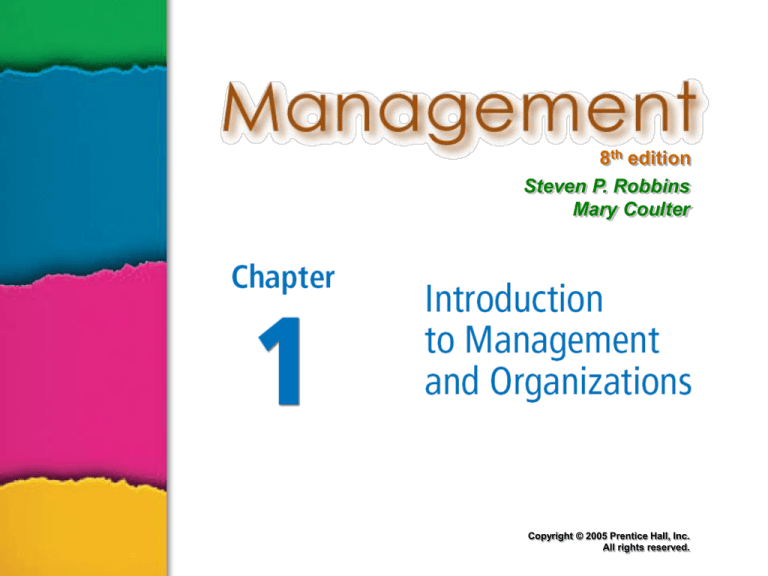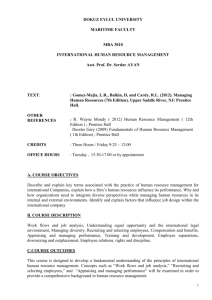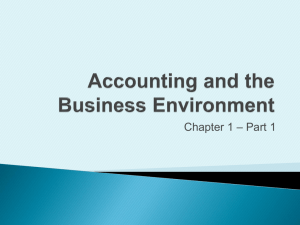
8th edition
Steven P. Robbins
Mary Coulter
Copyright © 2005 Prentice Hall, Inc.
All rights reserved.
Who Are Managers?*
• Manager
Someone who works with and through other people
by coordinating, integrating and monitoring their work
activities in order to accomplish organizational goals.
Copyright © 2005 Prentice Hall, Inc. All rights reserved.
1–2
Classifying Managers*
• 1. First-line Managers also called supervisors
Are at the lowest level of management and manage the
work of non-managerial employees e.g. Shift managers,
district managers, etc.
• 2. Middle Managers
Manage the work of first-line managers e.g. Regional
manager, project leader, store manager, etc.
• 3. Top Managers
Are responsible for making organization-wide decisions
and establishing plans and goals that affect the entire
organization e.g. Managing director, CEO, COO, President,
etc.
Copyright © 2005 Prentice Hall, Inc. All rights reserved.
1–3
Managerial Levels*
Traditionally structured organizations –
shaped like a pyramid.
Exhibit 1.1
Copyright © 2005 Prentice Hall, Inc. All rights reserved.
1–4
What Is Management?*
It is what managers do.
Formal definition - It involves coordinating and
overseeing the work activities of others so that their
activities are completed efficiently and effectively.
• Managerial Concerns
Efficiency
“Doing things right”
– Getting the most output
for the least inputs
Effectiveness
“Doing the right things”
– Attaining organizational
goals
1–5
Effectiveness and Efficiency in Management
Exhibit 1.2
Copyright © 2005 Prentice Hall, Inc. All rights reserved.
1–6
What Do Managers Do?*
• Functional Approach – first suggested by Henri Fayol
in the early part of the twentieth century
Planning
Defining
goals, establishing strategies to achieve goals,
developing plans to integrate and coordinate activities.
Organizing
Arranging
and structuring work to accomplish
organizational goals.
Leading
Working
with and through people to accomplish goals.
Controlling
Monitoring,
comparing, and correcting the work.
Copyright © 2005 Prentice Hall, Inc. All rights reserved.
1–7
Management Functions
Exhibit 1.3
Copyright © 2005 Prentice Hall, Inc. All rights reserved.
1–8
What Do Managers Do? (cont’d)*
• Management Roles
Approach–Henry Mintzberg
Interpersonal roles
Figurehead,
leader, liaison
Informational roles
Monitor,
disseminator,
spokesperson
Decisional roles
Disturbance
handler,
resource allocator,
negotiator, entrepreneur
Copyright © 2005 Prentice Hall, Inc. All rights reserved.
1–9
What Do Managers Do? (cont’d)
• Skills Approach – developed by Robert L. Katz
Technical skills
Knowledge
and proficiency in a specific field
Human skills
The
ability to work well with other people
Conceptual skills
The
ability to think and conceptualize about abstract
and complex situations concerning the organization
Copyright © 2005 Prentice Hall, Inc. All rights reserved.
1–10
Skills Needed at Different Management Levels
Exhibit 1.5
Copyright © 2005 Prentice Hall, Inc. All rights reserved.
1–11
How The Manager’s Job Is Changing*
• The Increasing Importance of Customers
Customers: the reason that organizations exist
Managing
customer relationships is the responsibility of
all managers and employees.
Consistent high quality customer service is essential for
survival.
• Innovation
Doing things differently, exploring new territory, and
taking risks
Managers
should encourage employees to be aware of
and act on opportunities for innovation.
Copyright © 2005 Prentice Hall, Inc. All rights reserved.
1–12
What Is An Organization?
• An Organization Defined
A deliberate arrangement of people to accomplish
some specific purpose
• Common Characteristics of Organizations
Have a distinct purpose (goal)
Composed of people
Have a deliberate structure
Copyright © 2005 Prentice Hall, Inc. All rights reserved.
1–13
Characteristics of Organizations
Exhibit 1.9
Copyright © 2005 Prentice Hall, Inc. All rights reserved.
1–14
Why Study Management?
• The Value of Studying Management
The universality of management
Good
management is needed in all organizations.
The reality of work
Employees
either manage or are managed.
Rewards and challenges of being a manager
Management
offers challenging, exciting and creative
opportunities for meaningful and fulfilling work.
Successful managers receive significant monetary rewards
for their efforts.
MANAGEMENT IS BOTH SCIENCE AS WELL AS AN
ART.
Universal Need for Management
Exhibit 1.11
Copyright © 2005 Prentice Hall, Inc. All rights reserved.
1–16
Rewards and Challenges of Being A Manager
Exhibit 1.12
Copyright © 2005 Prentice Hall, Inc. All rights reserved.
1–17
The reality of management hierarchy….
Copyright © 2005 Prentice Hall, Inc. All rights reserved.
1–18





